Human Resource Management Report: Objectives and Strategies
VerifiedAdded on 2021/11/16
|8
|2336
|475
Report
AI Summary
This report on Human Resource Management (HRM) delves into key aspects crucial for organizational success. It begins by emphasizing the importance of having the right resources and people, defining HRM as the framework for managing employer-employee relationships. The report then explores staffing objectives, including recruitment strategies like advertising and selection processes such as interviews and panel assessments. It also discusses outsourcing as a staffing method and the management of employee release through resignation, retirement, and dismissal. The report further examines performance objectives, outlining the importance of performance management systems and the role of HR in employee development. Change management is discussed, highlighting the need for smooth transitions and the role of HR in facilitating acceptance of change. Finally, administrative objectives are addressed, including data management, ensuring employee welfare, and maintaining accurate records. The report concludes by emphasizing the role of HR in contributing to organizational strategies and overall success.
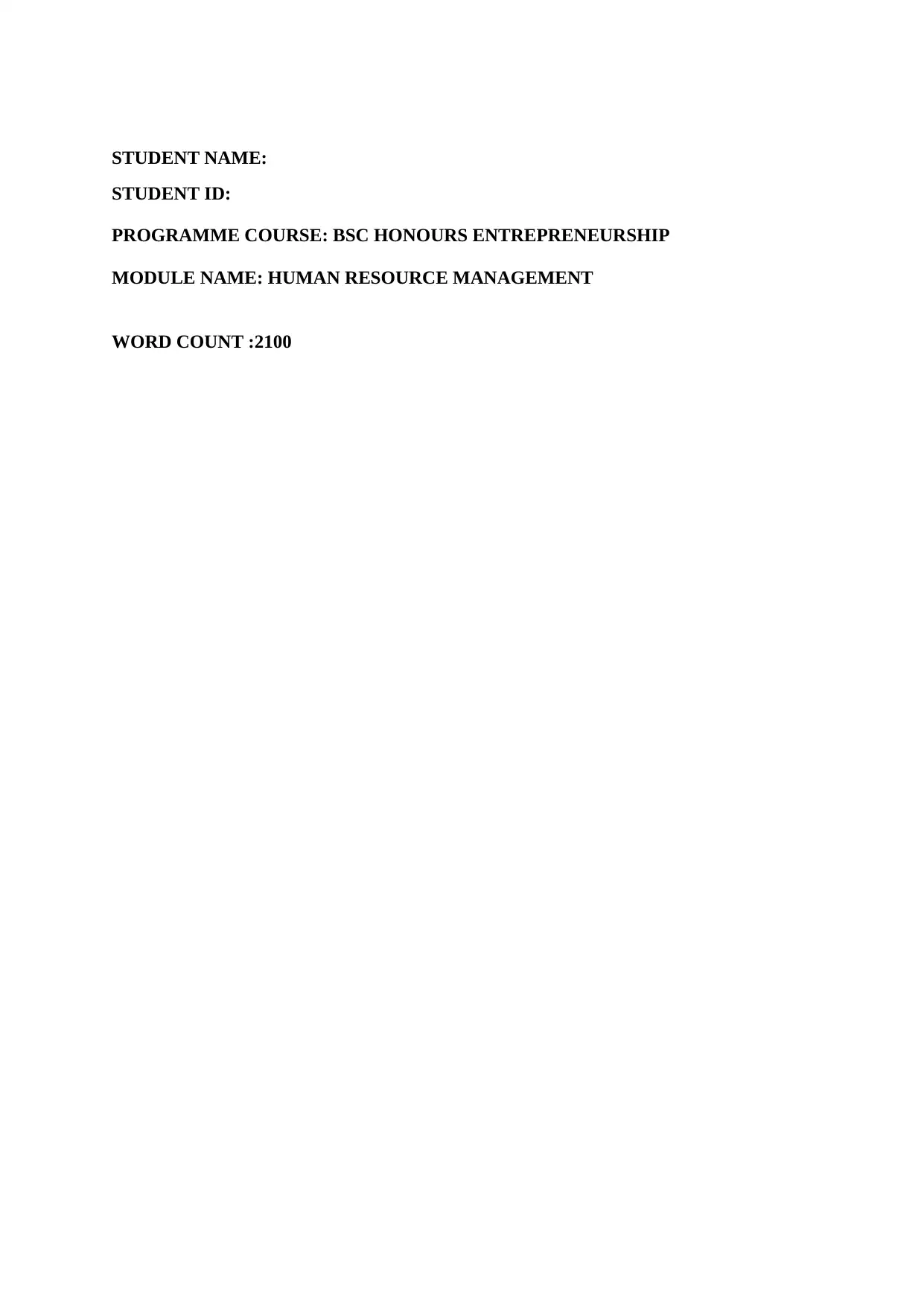
STUDENT NAME:
STUDENT ID:
PROGRAMME COURSE: BSC HONOURS ENTREPRENEURSHIP
MODULE NAME: HUMAN RESOURCE MANAGEMENT
WORD COUNT :2100
STUDENT ID:
PROGRAMME COURSE: BSC HONOURS ENTREPRENEURSHIP
MODULE NAME: HUMAN RESOURCE MANAGEMENT
WORD COUNT :2100
Paraphrase This Document
Need a fresh take? Get an instant paraphrase of this document with our AI Paraphraser
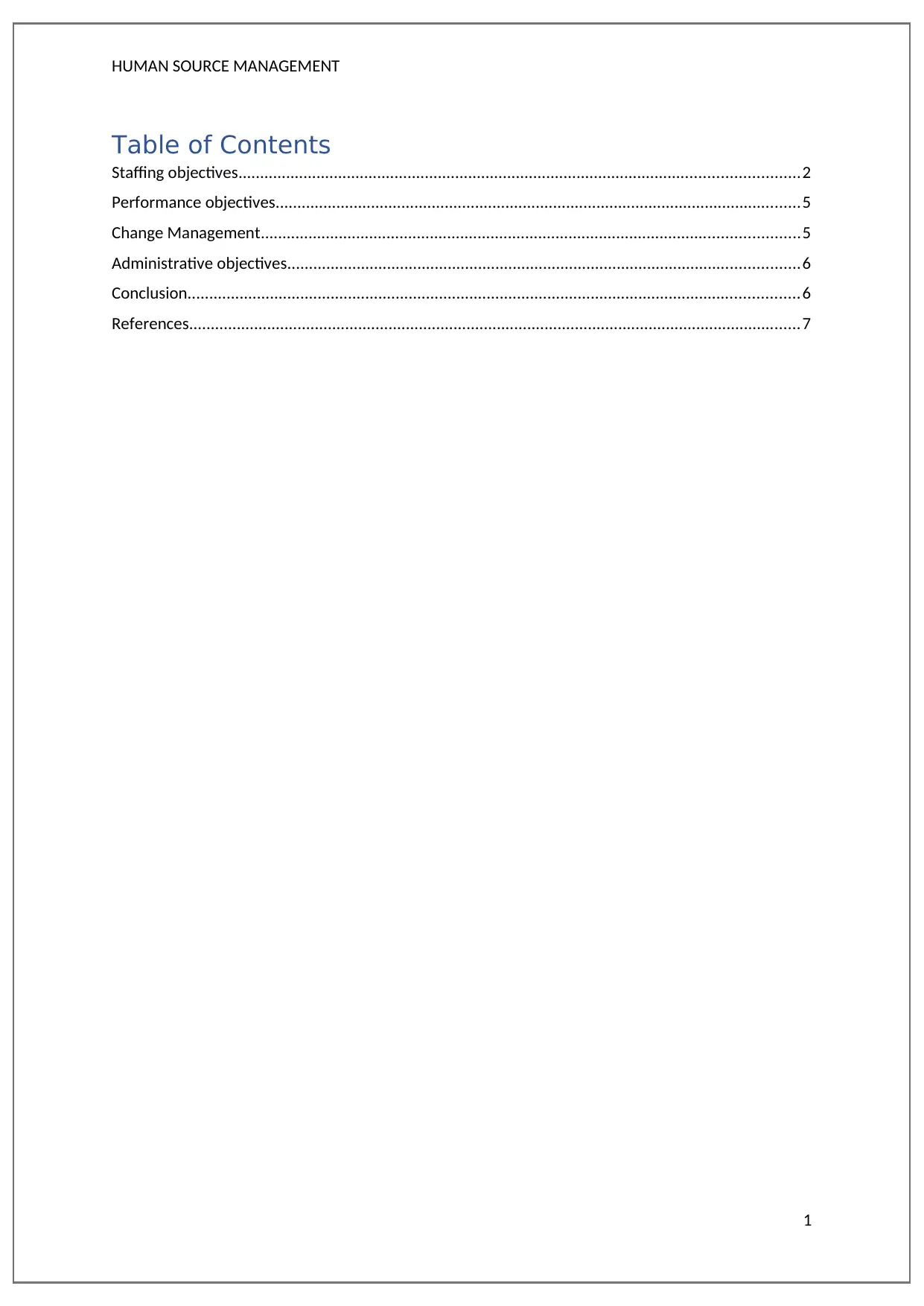
HUMAN SOURCE MANAGEMENT
Table of Contents
Staffing objectives.................................................................................................................................2
Performance objectives.........................................................................................................................5
Change Management............................................................................................................................5
Administrative objectives......................................................................................................................6
Conclusion.............................................................................................................................................6
References.............................................................................................................................................7
1
Table of Contents
Staffing objectives.................................................................................................................................2
Performance objectives.........................................................................................................................5
Change Management............................................................................................................................5
Administrative objectives......................................................................................................................6
Conclusion.............................................................................................................................................6
References.............................................................................................................................................7
1
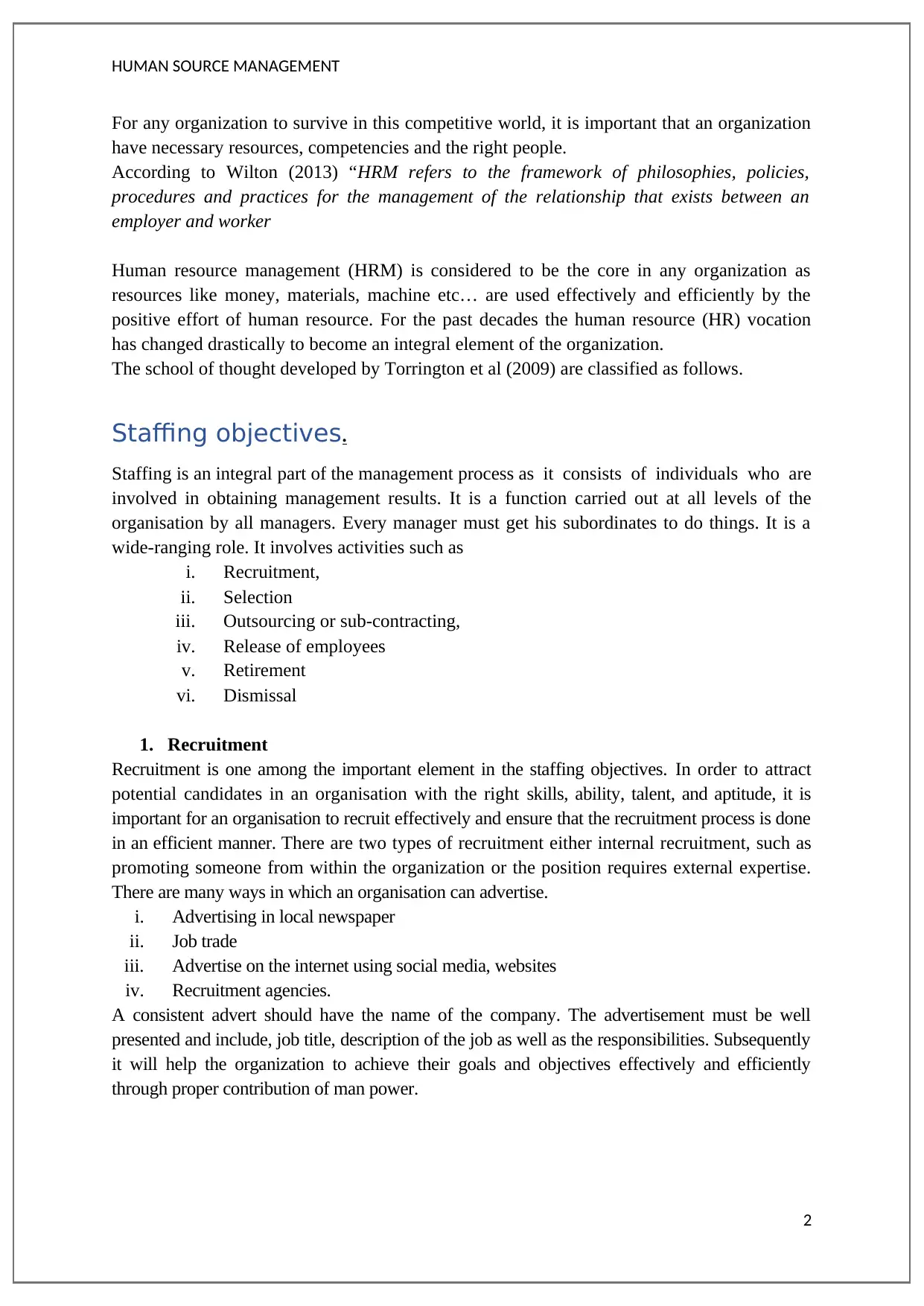
HUMAN SOURCE MANAGEMENT
For any organization to survive in this competitive world, it is important that an organization
have necessary resources, competencies and the right people.
According to Wilton (2013) “HRM refers to the framework of philosophies, policies,
procedures and practices for the management of the relationship that exists between an
employer and worker
Human resource management (HRM) is considered to be the core in any organization as
resources like money, materials, machine etc… are used effectively and efficiently by the
positive effort of human resource. For the past decades the human resource (HR) vocation
has changed drastically to become an integral element of the organization.
The school of thought developed by Torrington et al (2009) are classified as follows.
Staffing objectives.
Staffing is an integral part of the management process as it consists of individuals who are
involved in obtaining management results. It is a function carried out at all levels of the
organisation by all managers. Every manager must get his subordinates to do things. It is a
wide-ranging role. It involves activities such as
i. Recruitment,
ii. Selection
iii. Outsourcing or sub-contracting,
iv. Release of employees
v. Retirement
vi. Dismissal
1. Recruitment
Recruitment is one among the important element in the staffing objectives. In order to attract
potential candidates in an organisation with the right skills, ability, talent, and aptitude, it is
important for an organisation to recruit effectively and ensure that the recruitment process is done
in an efficient manner. There are two types of recruitment either internal recruitment, such as
promoting someone from within the organization or the position requires external expertise.
There are many ways in which an organisation can advertise.
i. Advertising in local newspaper
ii. Job trade
iii. Advertise on the internet using social media, websites
iv. Recruitment agencies.
A consistent advert should have the name of the company. The advertisement must be well
presented and include, job title, description of the job as well as the responsibilities. Subsequently
it will help the organization to achieve their goals and objectives effectively and efficiently
through proper contribution of man power.
2
For any organization to survive in this competitive world, it is important that an organization
have necessary resources, competencies and the right people.
According to Wilton (2013) “HRM refers to the framework of philosophies, policies,
procedures and practices for the management of the relationship that exists between an
employer and worker
Human resource management (HRM) is considered to be the core in any organization as
resources like money, materials, machine etc… are used effectively and efficiently by the
positive effort of human resource. For the past decades the human resource (HR) vocation
has changed drastically to become an integral element of the organization.
The school of thought developed by Torrington et al (2009) are classified as follows.
Staffing objectives.
Staffing is an integral part of the management process as it consists of individuals who are
involved in obtaining management results. It is a function carried out at all levels of the
organisation by all managers. Every manager must get his subordinates to do things. It is a
wide-ranging role. It involves activities such as
i. Recruitment,
ii. Selection
iii. Outsourcing or sub-contracting,
iv. Release of employees
v. Retirement
vi. Dismissal
1. Recruitment
Recruitment is one among the important element in the staffing objectives. In order to attract
potential candidates in an organisation with the right skills, ability, talent, and aptitude, it is
important for an organisation to recruit effectively and ensure that the recruitment process is done
in an efficient manner. There are two types of recruitment either internal recruitment, such as
promoting someone from within the organization or the position requires external expertise.
There are many ways in which an organisation can advertise.
i. Advertising in local newspaper
ii. Job trade
iii. Advertise on the internet using social media, websites
iv. Recruitment agencies.
A consistent advert should have the name of the company. The advertisement must be well
presented and include, job title, description of the job as well as the responsibilities. Subsequently
it will help the organization to achieve their goals and objectives effectively and efficiently
through proper contribution of man power.
2
⊘ This is a preview!⊘
Do you want full access?
Subscribe today to unlock all pages.

Trusted by 1+ million students worldwide
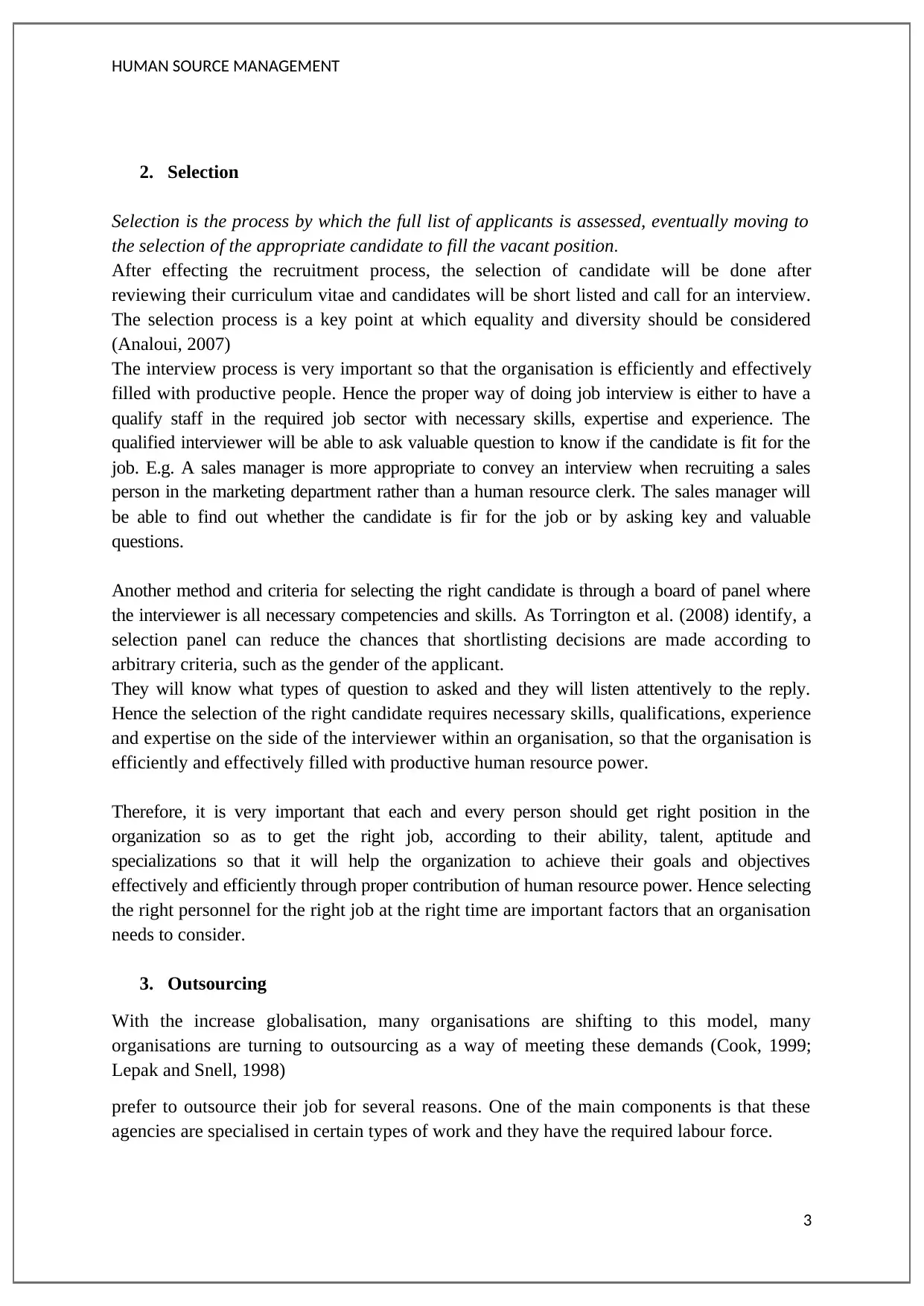
HUMAN SOURCE MANAGEMENT
2. Selection
Selection is the process by which the full list of applicants is assessed, eventually moving to
the selection of the appropriate candidate to fill the vacant position.
After effecting the recruitment process, the selection of candidate will be done after
reviewing their curriculum vitae and candidates will be short listed and call for an interview.
The selection process is a key point at which equality and diversity should be considered
(Analoui, 2007)
The interview process is very important so that the organisation is efficiently and effectively
filled with productive people. Hence the proper way of doing job interview is either to have a
qualify staff in the required job sector with necessary skills, expertise and experience. The
qualified interviewer will be able to ask valuable question to know if the candidate is fit for the
job. E.g. A sales manager is more appropriate to convey an interview when recruiting a sales
person in the marketing department rather than a human resource clerk. The sales manager will
be able to find out whether the candidate is fir for the job or by asking key and valuable
questions.
Another method and criteria for selecting the right candidate is through a board of panel where
the interviewer is all necessary competencies and skills. As Torrington et al. (2008) identify, a
selection panel can reduce the chances that shortlisting decisions are made according to
arbitrary criteria, such as the gender of the applicant.
They will know what types of question to asked and they will listen attentively to the reply.
Hence the selection of the right candidate requires necessary skills, qualifications, experience
and expertise on the side of the interviewer within an organisation, so that the organisation is
efficiently and effectively filled with productive human resource power.
Therefore, it is very important that each and every person should get right position in the
organization so as to get the right job, according to their ability, talent, aptitude and
specializations so that it will help the organization to achieve their goals and objectives
effectively and efficiently through proper contribution of human resource power. Hence selecting
the right personnel for the right job at the right time are important factors that an organisation
needs to consider.
3. Outsourcing
With the increase globalisation, many organisations are shifting to this model, many
organisations are turning to outsourcing as a way of meeting these demands (Cook, 1999;
Lepak and Snell, 1998)
prefer to outsource their job for several reasons. One of the main components is that these
agencies are specialised in certain types of work and they have the required labour force.
3
2. Selection
Selection is the process by which the full list of applicants is assessed, eventually moving to
the selection of the appropriate candidate to fill the vacant position.
After effecting the recruitment process, the selection of candidate will be done after
reviewing their curriculum vitae and candidates will be short listed and call for an interview.
The selection process is a key point at which equality and diversity should be considered
(Analoui, 2007)
The interview process is very important so that the organisation is efficiently and effectively
filled with productive people. Hence the proper way of doing job interview is either to have a
qualify staff in the required job sector with necessary skills, expertise and experience. The
qualified interviewer will be able to ask valuable question to know if the candidate is fit for the
job. E.g. A sales manager is more appropriate to convey an interview when recruiting a sales
person in the marketing department rather than a human resource clerk. The sales manager will
be able to find out whether the candidate is fir for the job or by asking key and valuable
questions.
Another method and criteria for selecting the right candidate is through a board of panel where
the interviewer is all necessary competencies and skills. As Torrington et al. (2008) identify, a
selection panel can reduce the chances that shortlisting decisions are made according to
arbitrary criteria, such as the gender of the applicant.
They will know what types of question to asked and they will listen attentively to the reply.
Hence the selection of the right candidate requires necessary skills, qualifications, experience
and expertise on the side of the interviewer within an organisation, so that the organisation is
efficiently and effectively filled with productive human resource power.
Therefore, it is very important that each and every person should get right position in the
organization so as to get the right job, according to their ability, talent, aptitude and
specializations so that it will help the organization to achieve their goals and objectives
effectively and efficiently through proper contribution of human resource power. Hence selecting
the right personnel for the right job at the right time are important factors that an organisation
needs to consider.
3. Outsourcing
With the increase globalisation, many organisations are shifting to this model, many
organisations are turning to outsourcing as a way of meeting these demands (Cook, 1999;
Lepak and Snell, 1998)
prefer to outsource their job for several reasons. One of the main components is that these
agencies are specialised in certain types of work and they have the required labour force.
3
Paraphrase This Document
Need a fresh take? Get an instant paraphrase of this document with our AI Paraphraser
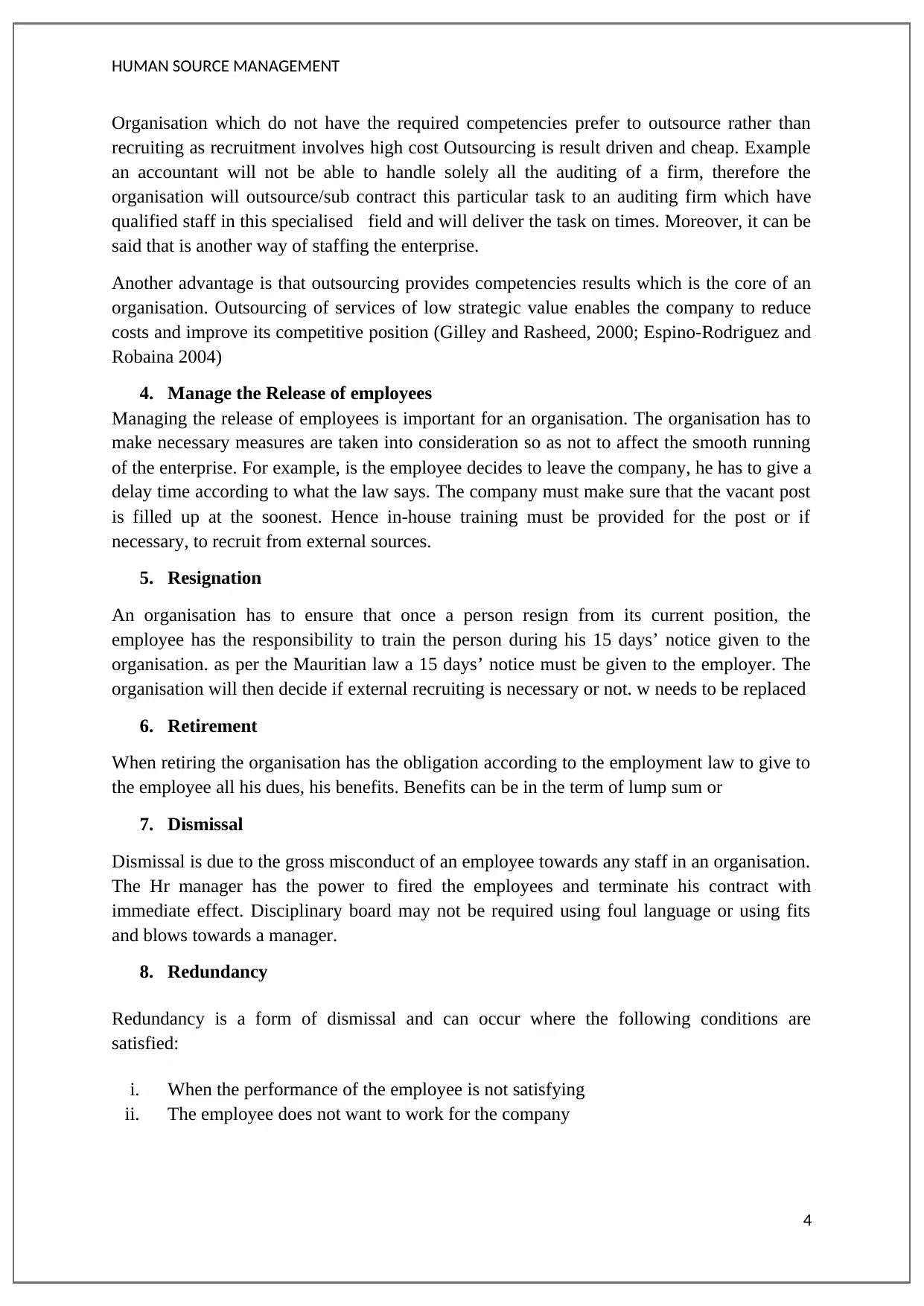
HUMAN SOURCE MANAGEMENT
Organisation which do not have the required competencies prefer to outsource rather than
recruiting as recruitment involves high cost Outsourcing is result driven and cheap. Example
an accountant will not be able to handle solely all the auditing of a firm, therefore the
organisation will outsource/sub contract this particular task to an auditing firm which have
qualified staff in this specialised field and will deliver the task on times. Moreover, it can be
said that is another way of staffing the enterprise.
Another advantage is that outsourcing provides competencies results which is the core of an
organisation. Outsourcing of services of low strategic value enables the company to reduce
costs and improve its competitive position (Gilley and Rasheed, 2000; Espino-Rodriguez and
Robaina 2004)
4. Manage the Release of employees
Managing the release of employees is important for an organisation. The organisation has to
make necessary measures are taken into consideration so as not to affect the smooth running
of the enterprise. For example, is the employee decides to leave the company, he has to give a
delay time according to what the law says. The company must make sure that the vacant post
is filled up at the soonest. Hence in-house training must be provided for the post or if
necessary, to recruit from external sources.
5. Resignation
An organisation has to ensure that once a person resign from its current position, the
employee has the responsibility to train the person during his 15 days’ notice given to the
organisation. as per the Mauritian law a 15 days’ notice must be given to the employer. The
organisation will then decide if external recruiting is necessary or not. w needs to be replaced
6. Retirement
When retiring the organisation has the obligation according to the employment law to give to
the employee all his dues, his benefits. Benefits can be in the term of lump sum or
7. Dismissal
Dismissal is due to the gross misconduct of an employee towards any staff in an organisation.
The Hr manager has the power to fired the employees and terminate his contract with
immediate effect. Disciplinary board may not be required using foul language or using fits
and blows towards a manager.
8. Redundancy
Redundancy is a form of dismissal and can occur where the following conditions are
satisfied:
i. When the performance of the employee is not satisfying
ii. The employee does not want to work for the company
4
Organisation which do not have the required competencies prefer to outsource rather than
recruiting as recruitment involves high cost Outsourcing is result driven and cheap. Example
an accountant will not be able to handle solely all the auditing of a firm, therefore the
organisation will outsource/sub contract this particular task to an auditing firm which have
qualified staff in this specialised field and will deliver the task on times. Moreover, it can be
said that is another way of staffing the enterprise.
Another advantage is that outsourcing provides competencies results which is the core of an
organisation. Outsourcing of services of low strategic value enables the company to reduce
costs and improve its competitive position (Gilley and Rasheed, 2000; Espino-Rodriguez and
Robaina 2004)
4. Manage the Release of employees
Managing the release of employees is important for an organisation. The organisation has to
make necessary measures are taken into consideration so as not to affect the smooth running
of the enterprise. For example, is the employee decides to leave the company, he has to give a
delay time according to what the law says. The company must make sure that the vacant post
is filled up at the soonest. Hence in-house training must be provided for the post or if
necessary, to recruit from external sources.
5. Resignation
An organisation has to ensure that once a person resign from its current position, the
employee has the responsibility to train the person during his 15 days’ notice given to the
organisation. as per the Mauritian law a 15 days’ notice must be given to the employer. The
organisation will then decide if external recruiting is necessary or not. w needs to be replaced
6. Retirement
When retiring the organisation has the obligation according to the employment law to give to
the employee all his dues, his benefits. Benefits can be in the term of lump sum or
7. Dismissal
Dismissal is due to the gross misconduct of an employee towards any staff in an organisation.
The Hr manager has the power to fired the employees and terminate his contract with
immediate effect. Disciplinary board may not be required using foul language or using fits
and blows towards a manager.
8. Redundancy
Redundancy is a form of dismissal and can occur where the following conditions are
satisfied:
i. When the performance of the employee is not satisfying
ii. The employee does not want to work for the company
4

HUMAN SOURCE MANAGEMENT
Every organisation should have a formal redundancy procedure which outlines the steps
which will be taken and the criteria that will be used to make decisions. Whilst the exact
procedure will vary from organisation to organisation, they should give an advance warning
to the employees of the impending redundancy.
Organisation must effectively manage the process and remain compliant with relevant
legislation
Staffing is important to the HR and the management as the right person are hired at the right
position at the right place so it provides efficient performance to the departments where the right
individual is hired and also employees are a productive employee will be more productive with
high morale.
Performance objectives.
The performance Management system is a process followed in the organization to determine
the level of performance of employees. It also determines the performance of the
organisational structure. It rewards a performing employee, identifies his or her weaknesses
and gaps and provides suggestions for addressing the gap.
HR ensure that the company has qualified staff to perform the work. HR helps mangers work
with their staff and encourage the growth of employees, leading to productivity.
In order to measure the effectiveness, there are some control that need an organisation will set
up. For example, the HR provides checklists, templates and forms for performance
assessments.
HR also ensures that the manager provides monthly reports based on their employees ' perfor
mance status. If the manager needs to develop the skills of the staff based
on certain projects or tasks,
HR also schedules regular meetings and receives feedback.
Change Management
Change management is a process for for the transition from the old state to the new state of
employees, departments, and the whole organisation.
The main objectives are to make employees accept the change with less resilience, so as to
for the betterment of the organisation as well as for employees’ benefits, however
organisation may face some challenges as some employees are stubborn and resistant to
change. improvement in the organisation.
It is also a system consisting of planning, analysis, and execution of attempts to experience
less disruption in order to make the transition as smooth as possible, both short term and long
term. By engaging in the planning and execution phases with stakeholders and by
understating the needs and expectation during the change the HR can facilitate change
management.
5
Every organisation should have a formal redundancy procedure which outlines the steps
which will be taken and the criteria that will be used to make decisions. Whilst the exact
procedure will vary from organisation to organisation, they should give an advance warning
to the employees of the impending redundancy.
Organisation must effectively manage the process and remain compliant with relevant
legislation
Staffing is important to the HR and the management as the right person are hired at the right
position at the right place so it provides efficient performance to the departments where the right
individual is hired and also employees are a productive employee will be more productive with
high morale.
Performance objectives.
The performance Management system is a process followed in the organization to determine
the level of performance of employees. It also determines the performance of the
organisational structure. It rewards a performing employee, identifies his or her weaknesses
and gaps and provides suggestions for addressing the gap.
HR ensure that the company has qualified staff to perform the work. HR helps mangers work
with their staff and encourage the growth of employees, leading to productivity.
In order to measure the effectiveness, there are some control that need an organisation will set
up. For example, the HR provides checklists, templates and forms for performance
assessments.
HR also ensures that the manager provides monthly reports based on their employees ' perfor
mance status. If the manager needs to develop the skills of the staff based
on certain projects or tasks,
HR also schedules regular meetings and receives feedback.
Change Management
Change management is a process for for the transition from the old state to the new state of
employees, departments, and the whole organisation.
The main objectives are to make employees accept the change with less resilience, so as to
for the betterment of the organisation as well as for employees’ benefits, however
organisation may face some challenges as some employees are stubborn and resistant to
change. improvement in the organisation.
It is also a system consisting of planning, analysis, and execution of attempts to experience
less disruption in order to make the transition as smooth as possible, both short term and long
term. By engaging in the planning and execution phases with stakeholders and by
understating the needs and expectation during the change the HR can facilitate change
management.
5
⊘ This is a preview!⊘
Do you want full access?
Subscribe today to unlock all pages.

Trusted by 1+ million students worldwide
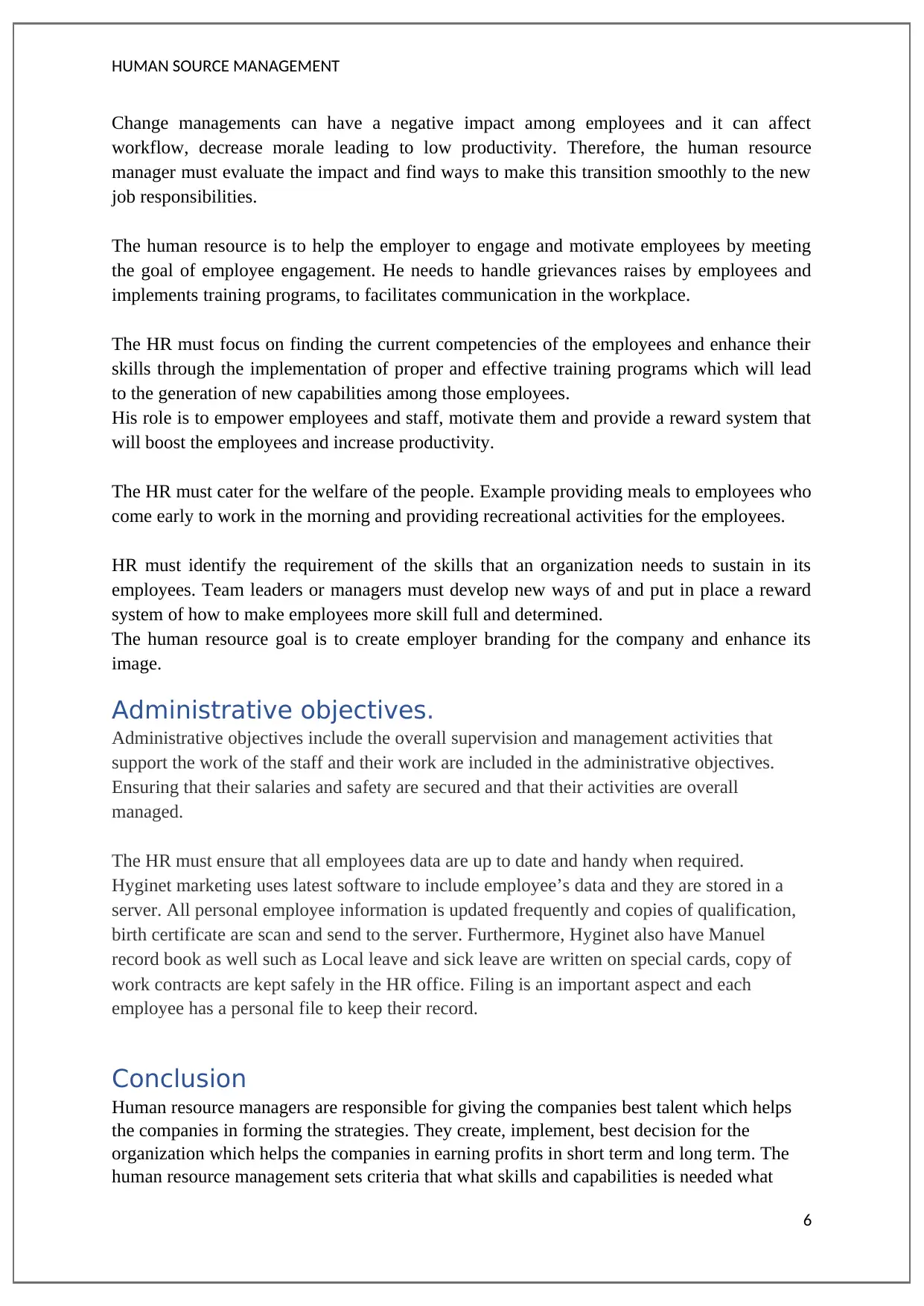
HUMAN SOURCE MANAGEMENT
Change managements can have a negative impact among employees and it can affect
workflow, decrease morale leading to low productivity. Therefore, the human resource
manager must evaluate the impact and find ways to make this transition smoothly to the new
job responsibilities.
The human resource is to help the employer to engage and motivate employees by meeting
the goal of employee engagement. He needs to handle grievances raises by employees and
implements training programs, to facilitates communication in the workplace.
The HR must focus on finding the current competencies of the employees and enhance their
skills through the implementation of proper and effective training programs which will lead
to the generation of new capabilities among those employees.
His role is to empower employees and staff, motivate them and provide a reward system that
will boost the employees and increase productivity.
The HR must cater for the welfare of the people. Example providing meals to employees who
come early to work in the morning and providing recreational activities for the employees.
HR must identify the requirement of the skills that an organization needs to sustain in its
employees. Team leaders or managers must develop new ways of and put in place a reward
system of how to make employees more skill full and determined.
The human resource goal is to create employer branding for the company and enhance its
image.
Administrative objectives.
Administrative objectives include the overall supervision and management activities that
support the work of the staff and their work are included in the administrative objectives.
Ensuring that their salaries and safety are secured and that their activities are overall
managed.
The HR must ensure that all employees data are up to date and handy when required.
Hyginet marketing uses latest software to include employee’s data and they are stored in a
server. All personal employee information is updated frequently and copies of qualification,
birth certificate are scan and send to the server. Furthermore, Hyginet also have Manuel
record book as well such as Local leave and sick leave are written on special cards, copy of
work contracts are kept safely in the HR office. Filing is an important aspect and each
employee has a personal file to keep their record.
Conclusion
Human resource managers are responsible for giving the companies best talent which helps
the companies in forming the strategies. They create, implement, best decision for the
organization which helps the companies in earning profits in short term and long term. The
human resource management sets criteria that what skills and capabilities is needed what
6
Change managements can have a negative impact among employees and it can affect
workflow, decrease morale leading to low productivity. Therefore, the human resource
manager must evaluate the impact and find ways to make this transition smoothly to the new
job responsibilities.
The human resource is to help the employer to engage and motivate employees by meeting
the goal of employee engagement. He needs to handle grievances raises by employees and
implements training programs, to facilitates communication in the workplace.
The HR must focus on finding the current competencies of the employees and enhance their
skills through the implementation of proper and effective training programs which will lead
to the generation of new capabilities among those employees.
His role is to empower employees and staff, motivate them and provide a reward system that
will boost the employees and increase productivity.
The HR must cater for the welfare of the people. Example providing meals to employees who
come early to work in the morning and providing recreational activities for the employees.
HR must identify the requirement of the skills that an organization needs to sustain in its
employees. Team leaders or managers must develop new ways of and put in place a reward
system of how to make employees more skill full and determined.
The human resource goal is to create employer branding for the company and enhance its
image.
Administrative objectives.
Administrative objectives include the overall supervision and management activities that
support the work of the staff and their work are included in the administrative objectives.
Ensuring that their salaries and safety are secured and that their activities are overall
managed.
The HR must ensure that all employees data are up to date and handy when required.
Hyginet marketing uses latest software to include employee’s data and they are stored in a
server. All personal employee information is updated frequently and copies of qualification,
birth certificate are scan and send to the server. Furthermore, Hyginet also have Manuel
record book as well such as Local leave and sick leave are written on special cards, copy of
work contracts are kept safely in the HR office. Filing is an important aspect and each
employee has a personal file to keep their record.
Conclusion
Human resource managers are responsible for giving the companies best talent which helps
the companies in forming the strategies. They create, implement, best decision for the
organization which helps the companies in earning profits in short term and long term. The
human resource management sets criteria that what skills and capabilities is needed what
6
Paraphrase This Document
Need a fresh take? Get an instant paraphrase of this document with our AI Paraphraser
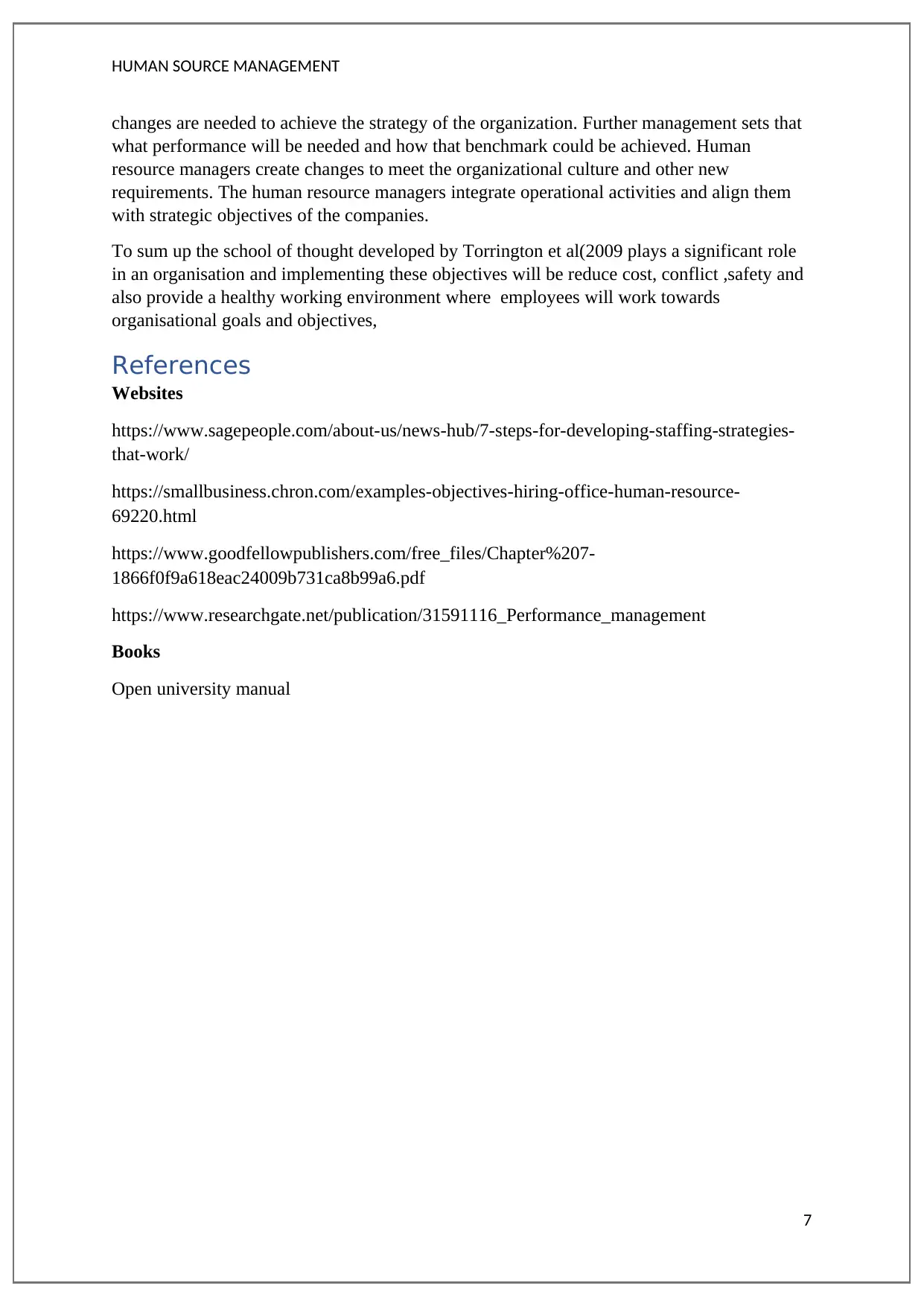
HUMAN SOURCE MANAGEMENT
changes are needed to achieve the strategy of the organization. Further management sets that
what performance will be needed and how that benchmark could be achieved. Human
resource managers create changes to meet the organizational culture and other new
requirements. The human resource managers integrate operational activities and align them
with strategic objectives of the companies.
To sum up the school of thought developed by Torrington et al(2009 plays a significant role
in an organisation and implementing these objectives will be reduce cost, conflict ,safety and
also provide a healthy working environment where employees will work towards
organisational goals and objectives,
References
Websites
https://www.sagepeople.com/about-us/news-hub/7-steps-for-developing-staffing-strategies-
that-work/
https://smallbusiness.chron.com/examples-objectives-hiring-office-human-resource-
69220.html
https://www.goodfellowpublishers.com/free_files/Chapter%207-
1866f0f9a618eac24009b731ca8b99a6.pdf
https://www.researchgate.net/publication/31591116_Performance_management
Books
Open university manual
7
changes are needed to achieve the strategy of the organization. Further management sets that
what performance will be needed and how that benchmark could be achieved. Human
resource managers create changes to meet the organizational culture and other new
requirements. The human resource managers integrate operational activities and align them
with strategic objectives of the companies.
To sum up the school of thought developed by Torrington et al(2009 plays a significant role
in an organisation and implementing these objectives will be reduce cost, conflict ,safety and
also provide a healthy working environment where employees will work towards
organisational goals and objectives,
References
Websites
https://www.sagepeople.com/about-us/news-hub/7-steps-for-developing-staffing-strategies-
that-work/
https://smallbusiness.chron.com/examples-objectives-hiring-office-human-resource-
69220.html
https://www.goodfellowpublishers.com/free_files/Chapter%207-
1866f0f9a618eac24009b731ca8b99a6.pdf
https://www.researchgate.net/publication/31591116_Performance_management
Books
Open university manual
7
1 out of 8
Related Documents
Your All-in-One AI-Powered Toolkit for Academic Success.
+13062052269
info@desklib.com
Available 24*7 on WhatsApp / Email
![[object Object]](/_next/static/media/star-bottom.7253800d.svg)
Unlock your academic potential
Copyright © 2020–2026 A2Z Services. All Rights Reserved. Developed and managed by ZUCOL.





